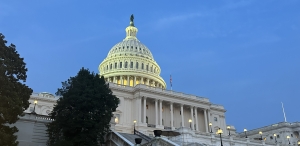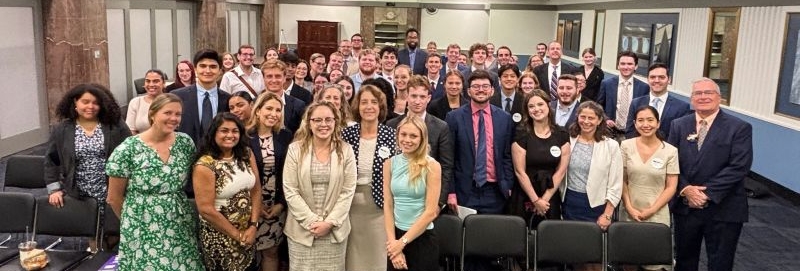Perkins Act 101 Congressional Staff Briefing w/ JFF & ACTE
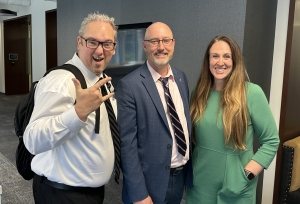
On June 6, the Advance CTE team was thrilled to partner with colleagues from Jobs for the Future (JFF) and the Association of Career Technical Education (ACTE) to host Congressional staff for a nearly full day of diving deep into the Carl D. Perkins Career and Technical Education Act (Perkins V). Three CTE state directors and Advance CTE members, Jon Wickert (DE), Leah Amstutz (OH), and Richard Kincaid (MD), came to Washington, D.C., to share their expertise in implementing Perkins V and provide insight into how future federal policy can help build flexible and responsive state CTE systems.
The main objective of the Perkins 101 session was to provide Congressional staff a comprehensive overview of the purpose and key components of the Perkins V legislation and showcase effective implementation.
The conversation consistently exceeded the time blocks set for specific topics – starting with a brief history and overview of the law, before diving into the state planning and CLNA process, and the details that emerged under Perkins V regarding data, accountability, and special populations. Then, it was the state directors’ time to shine, discussing the implementation of program quality indicators 5S1, 5S2, and 5S3 and many other key aspects of their state CTE systems. It was a great opportunity for the state directors to engage and communicate the ins and outs of the Perkins V legislation, as well as Advance CTE staff Emily Passias and Steve Voytek, who helped to facilitate portions of these conversations.
This briefing was timely, as the Perkins Act was last reauthorized as the Strengthening Career and Technical Education for the 21st Century Act in 2018 and is now due for another update. A big thanks to partners at JFF for enabling and organizing the briefing and continued partnership with ACTE to further advocate for high-quality CTE programs and related policies.
Alliance for Learning Innovation
On June 25, I headed to Capitol Hill to attend the Alliance for Learning Innovation’s (ALI) congressional briefing “A New Blueprint for Education Research and Innovation.” The briefing centered on the blueprint in a discussion of working to improve student achievement and highlighted recent successes such as the Mississippi Miracle. The event also focused on strategies to improve the learning assessments through co-designed, learner-focused examples like the Assessment for Good. In her remarks, ALI executive director Sara Schapiro (bio) raised questions about what modernizing data infrastructure actually means and how greater investment in data infrastructure leads to more learners accessing careers. A panel comprised of education and workforce leaders from local, state, and national levels offered insight that included informing teachers by connecting them to research and the importance of building an evidence base that can support quick decision making.
It was an excellent opportunity to hear from the field about developing a data ecosystem that supports learners’ economic mobility and local economic development that starts in the classroom. Click here to read more about ALI’s efforts.
#EdFundsNow
This summer, the Office of Management and Budget (OMB) delayed nearly $7 billion in federal education funds on June 30 for a “programmatic review”. The funds, which included support for 21st Century Community Learning Centers, ESSA Titles II and IV-A, and Adult Basic Education (WIOA Title II), were released on July 25 following pressure from Congress and the wider education and workforce development community.
Advance CTE joined more than 600 organizations in sending a letter to OMB Director Vought urging the administration to release these funds. The impacts of funding delays for state and local education agencies are still unclear, as states and school districts typically receive the funds on July 1 as they get ready to open schools for the upcoming school year. To learn more, click here to view the #EdFundsNow website.
CEF Advocacy Day & Budget Book
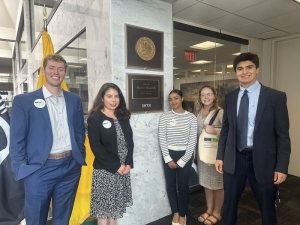 The Committee for Education Funding (CEF) held its annual advocacy day on July 16./. CEF coalition members assembled into advocacy teams to meet with congressional staff in Democratic and Republican offices and in both chambers of Congress. I represented Advance CTE with meetings on the Senate side of the Hill, meeting with staffers in an office, a hallway, and a satellite conference room to advocate for investment in the Basic State Grant in Perkins V, as well as increased investment along the broader education continuum that benefits learners through college and career readiness efforts. I was on a team that met with staffers working for Sen. Marsha Blackburn (R-TN), Sen. Martin Heinrich (D-NM), and Sen. Jack Reed (D-RI) – the latter two who work on the Labor-HHS-ED Appropriations Subcommittee.
The Committee for Education Funding (CEF) held its annual advocacy day on July 16./. CEF coalition members assembled into advocacy teams to meet with congressional staff in Democratic and Republican offices and in both chambers of Congress. I represented Advance CTE with meetings on the Senate side of the Hill, meeting with staffers in an office, a hallway, and a satellite conference room to advocate for investment in the Basic State Grant in Perkins V, as well as increased investment along the broader education continuum that benefits learners through college and career readiness efforts. I was on a team that met with staffers working for Sen. Marsha Blackburn (R-TN), Sen. Martin Heinrich (D-NM), and Sen. Jack Reed (D-RI) – the latter two who work on the Labor-HHS-ED Appropriations Subcommittee.
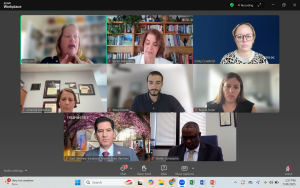 On July 30, New York state CTE director and Advance CTE member, Dr. Amy Cox, joined a panel of education leaders at the end of July for the CEF Budget Book briefing – “Education Matters: Continue to Invest in America’s Future.“ The briefing was a deep dive into the President’s education budget with insights across the full education spectrum – from early learning to adult workforce training.
On July 30, New York state CTE director and Advance CTE member, Dr. Amy Cox, joined a panel of education leaders at the end of July for the CEF Budget Book briefing – “Education Matters: Continue to Invest in America’s Future.“ The briefing was a deep dive into the President’s education budget with insights across the full education spectrum – from early learning to adult workforce training.
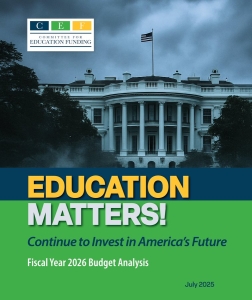 The CEF Budget Book features program vignettes, funding history, impact analysis, and charts showing the value of federal investment in education. Dr. Cox, Director of Career Readiness and Workforce Partnerships in New York, shared her expertise on the importance of CTE for economic development and its critical role in learner success in college and careers.
The CEF Budget Book features program vignettes, funding history, impact analysis, and charts showing the value of federal investment in education. Dr. Cox, Director of Career Readiness and Workforce Partnerships in New York, shared her expertise on the importance of CTE for economic development and its critical role in learner success in college and careers.
Click here to read the CEF budget book.
View from the Hill
This month, the halls of Congress have been quiet as lawmakers are back in their home districts for the annual August recess after a busy summer that included the passage of the “One Big Beautiful Bill Act” and a July rescissions package. Looking ahead, lawmakers will return in September to focus on fiscal year 2026 (FY26) appropriations. The Senate has already marked up its Labor-HHS-ED bill, which funds the Carl D. Perkins Career and Technical Education Act (Perkins V) and other key education and workforce programs. The House is expected to take up its version next month. Advance CTE will continue advocating for strong federal investments in Perkins V – stay tuned for updates.
Click here to subscribe to Advance CTE’s Federal Legislative Updates.

